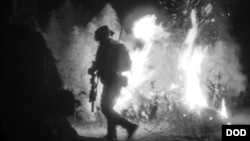The newly implemented U.S. strategy in Afghanistan is turning the tables on the Taliban. The new policy announced by President Trump in August has shifted U.S. military operations from a time-based mission to one that is now conditions-based. As General John Nicholson has stated, “We will be here until the job is done.”
During a recent briefing, Air Force Brigadier General Lance Bunch explained that a newly developed sustained air campaign is targeting the Taliban in their so-called safe zone, command and control nodes, illicit revenue-generating ventures, and their logistical networks.
Since November 20th, the U.S. military along with Afghan defense forces, have eliminated 25 narcotics processing labs from the Taliban inventory. This equates to almost $80 million of drug money eliminated from the kingpins’ pockets, while denying over $16 million of direct revenue to their Taliban partners.
The Taliban have never had to face a sustained targeting campaign focused on disrupting their illicit revenue activities. “And it's not over,” said Brigadier General Bunch. “In fact, it's only just begun. And this will be a very long winter for the Taliban, as we will continue to disrupt their revenue sources again and again and again.”
Prior to the policy shift, U.S. forces could only train, advise and assist the Afghans at the corps level, but the new South Asia policy will allow U.S. forces to embed with Afghans all the way down to the battalion level. Coupled with the air interdiction campaign, the strategy will allow Afghan defense forces to keep pressure on the Taliban through the winter.
As for the Taliban, they have fared poorly in 2017. Indeed, they have been unable to take a provincial capital or even a single city, said Brigadier General Bunch. “They underestimated us, and they underestimated the will of the majority of the Afghan people.” Eighty-seven percent of which believe the Taliban is bad for Afghanistan.
“Together with our Afghan partners,” said Brigadier General Bunch, we “are on the path to victory. We are working to achieve a negotiated settlement, to reduce violence to manageable levels” and create “a safe, secure and prosperous Afghanistan.”












